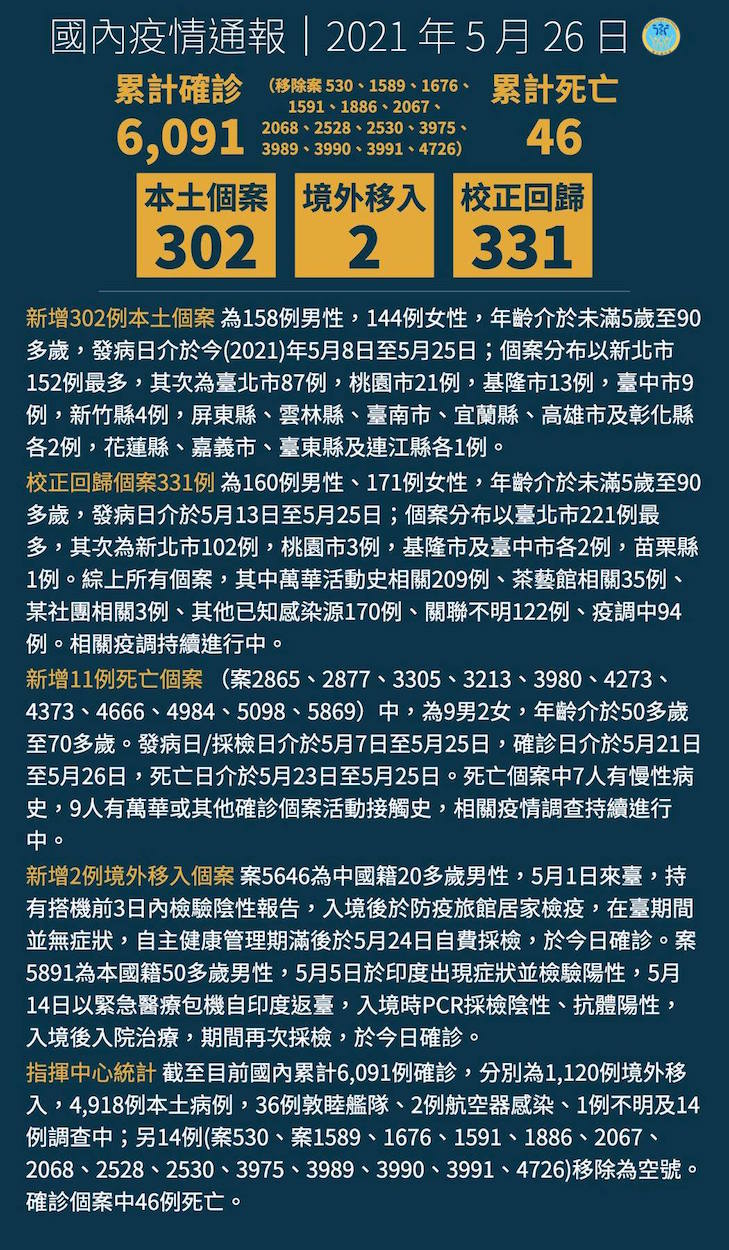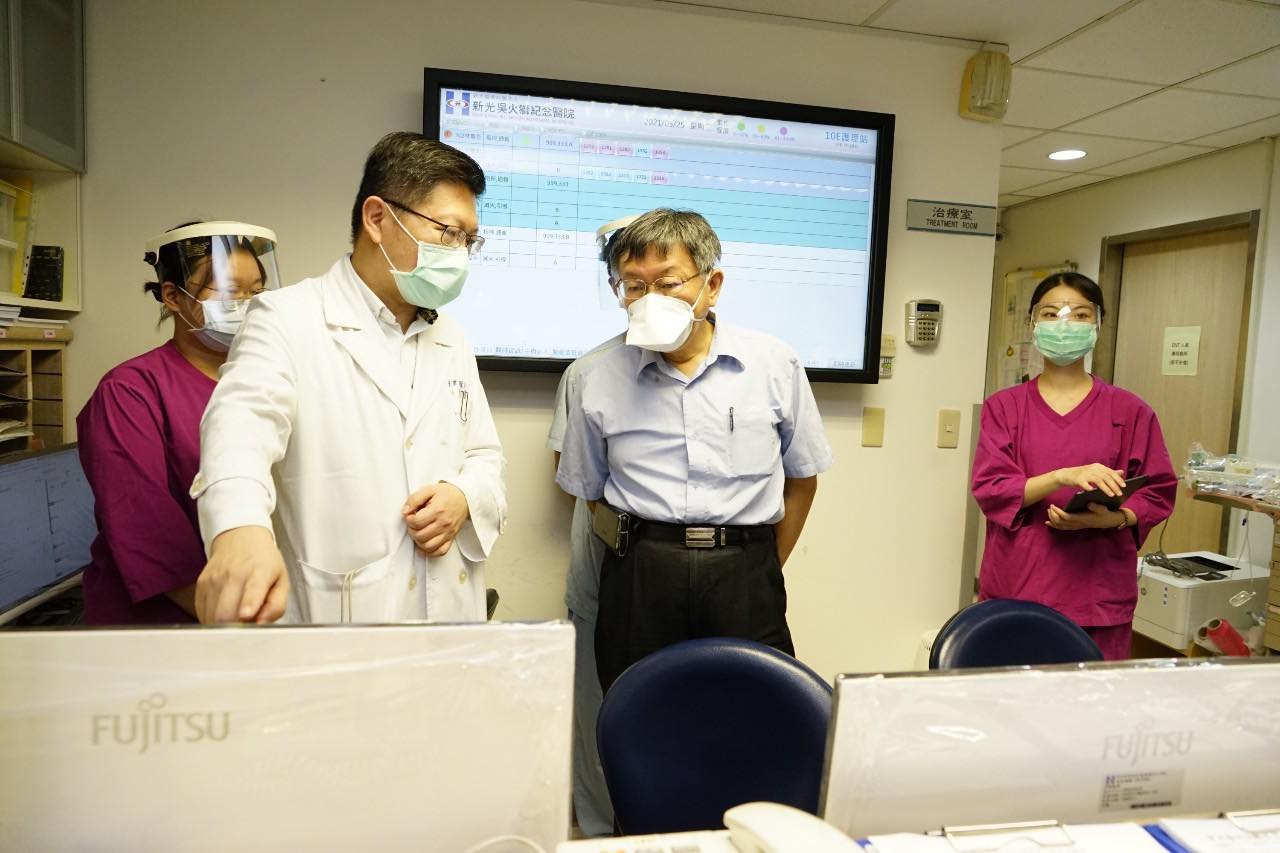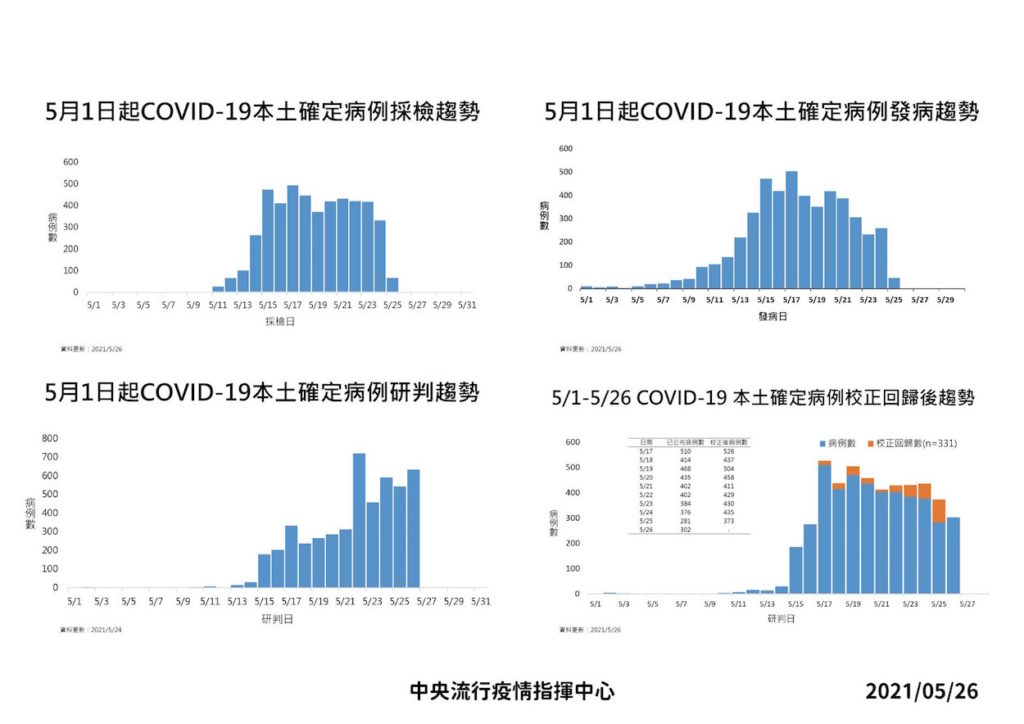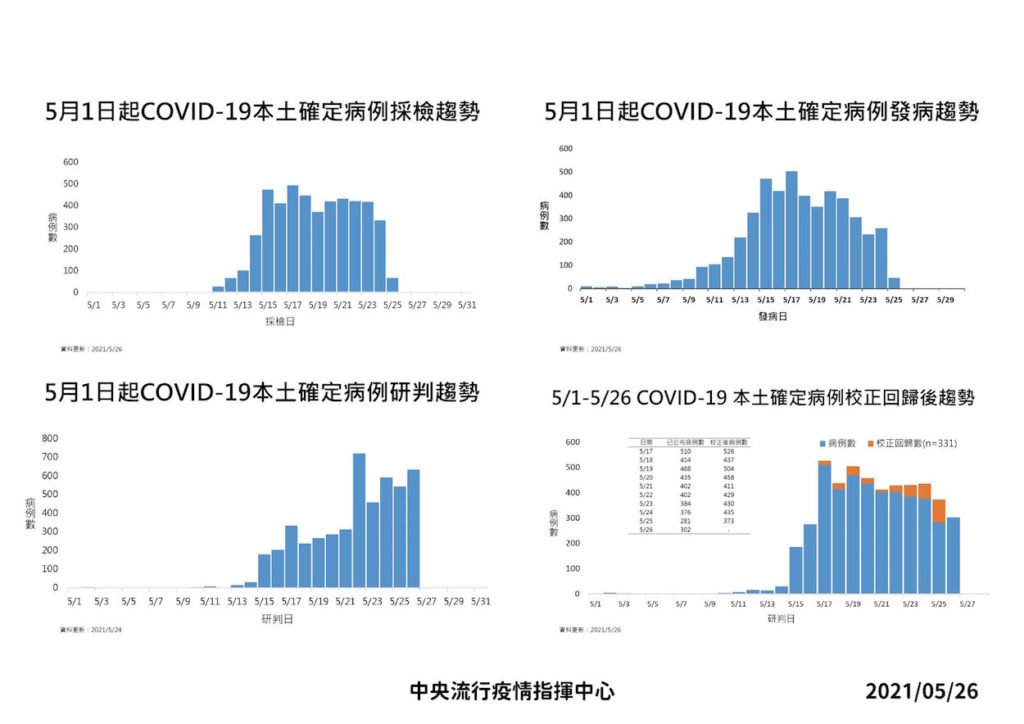by Brian Hioe
語言:
English
Photo Credit: Ko Wen-je/Facebook
MINISTER OF HEALTH and Welfare Chen Shih-chung announced 302 domestic cases, two imported cases, and 11 deaths at today’s Central Epidemic Command Center (CECC) press conference. 331 cases were also processed from the backlog, with two imported among those cases.
Today sees the largest number of deaths announced due to COVID-19 so far in Taiwan. The 11 deceased were hospitalized between May 21st and May 26th and died between May 23rd and May 25th, with nine cases linked to Wanhua.
New cases from today reported symptoms between May 8th and May 25th. 152 cases were in New Taipei, 87 in Taipei, 21 cases in Taoyuan, 13 cases in Keelung, nine cases in Taichung, and four cases in Hsinchu. Pingtung, Yunlin, Yilan, and Kaohsiung each reported two cases, and Hualien, Taitung, Chiayi, and Lienchang each reported one case.
 Data released by the CECC today. Photo credit: Ministry of Health and Welfare
Data released by the CECC today. Photo credit: Ministry of Health and Welfare
Of the cases added from the backlog, cases reported symptoms between May 13th and May 25th. 221 cases were in Taipei, 102 cases in New Taipei, three cases in Taoyuan, two cases in Keelung, and one case in Miaoli. Overall, 209 cases linked to places in Wanhua, with 35 linked to tea houses, 170 to other causes, and 122 cases of unknown origin. Revised data shows that cases again had a slight increase between May 21st and May 24th, amending past data that only showed a declining trend in cases, though the current data still shows a decline after that.
Chen announced a “strengthened” level three today, with indoor dining services suspended across Taiwan, all wedding and religious ceremonies canceled, and schools called on not to send students home from dormitories, while retaining remote teaching when possible. Police and firefighters will be added to groups eligible to receive vaccines, likely due to the role of police in enforcing limitations on public gatherings and cases of infections at police stations. While experts associated with the Taiwan Association for Human Rights previously called on the government to limit police activity during the outbreak, to avoid spreading COVID-19, it appears probable that the government may intend to go the opposite direction. Chen stressed that this is not a shift to a full lockdown, to avoid economic disruption, and in order to avoid issues regarding lockdown fatigue.
Splits between the central government and the Taipei city government are increasingly visible. Taipei mayor Ko Wen-je currently claims that the Taipei city Department of Health (DOH) only has two doses of AstraZeneca vaccine left, while the CECC states that Taipei was sent 7,000 vaccines, which means that around 700 should be left. The Taipei city government has also stated that to conserve hospital beds, patients with low PCR counts can quarantine at home, but the CECC states that hospitals should be acting as normal.
Likewise, allegations possibly originating from Taipei have been circulated that the CECC currently requires negative PCR tests to be sent to its Kunyang laboratory before patients can be discharged, slowing down the rate of discharges. When asked about this, the CECC has stated that PCR tests can be sent to the local department of health. Such allegations may be meant to attack the CECC, claiming that the CECC is attempting to assert its authority over and micro-manage local governments in a manner that may be slowing down efforts to fight COVID-19.
That being said, the CECC still asserted that local governments would probably have more accurate local statistics than the central government— there may be an information gap between the central government and local governments but that this should not lead to the spread of misinformation and disinformation. It is also to be noted that the central government and local governments diverge in some respect on narratives, with Taipei emphasizing a more pessimistic outlook than the central government. Taipei mayor Ko Wen-je claims that there will be another peak of cases around May 28th and that infection rates at testing sites are climbing again. While the CECC stated yesterday that infection rates were not significantly climbing for testing sites outside of Wanhua, Ko stated today that he hopes for Taipei residents to be wary of the belief that COVID-19 was confined to Wanhua.
Data released by the CECC today. Photo credit: Ministry of Health and Welfare
It is known that due to capacity issues, some patients have been sent from hospitals in northern Taiwan to southern Taiwan. However, the CECC has stated that this number of patients is low.
101 patients are on breathing machines, with two on ECMO. 378 or 6.9% of all patients are serious, with 152 possibly needing breathing assistance, around 2.8%. Minister Chen stated that medical resources are tight, but that the system is not on the verge of a breakdown.
There have been concerns about two patients being put in one room in hospitals, due to lack of capacity. For such cases, efforts have been made to improve ventilation and keep windows open, to COVID-19 spreading to nurses and doctors. Efforts are still underway to speed up the processing of COVID-19 testing, by simplifying the process for reporting test results and uploading them to the National Health Insurance system.
There continue to be concerns that new COVID-19 deaths are only confirmed positive after death, while waiting for the results of PCR tests. There is also concern about the health monitoring of individuals in quarantine, seeing as some patients only come into the hospital while in serious condition.
With the current level three alert extended until June 14th, a number of industries have been affected. Over 40 hotels and hostels in Yilan have suspended business, anticipating few customers. Taxi drivers and art workers are other industries that have reported significant effects, due to a lack of customers or events being canceled.
An employee of the Nanshijiao branch of the Huanan Bank has been confirmed positive with COVID-19, leading the bank branch to undergo disinfection. Six employees of a massage parlor suspected of violating restrictions on public gatherings have tested positive for COVID-19, which will likely result in a fine. Five workers at the Criminal Investigation Bureau have also become infected, while police officers in Ximen and Wenshan have also tested positive, as did an MRT worker that works at the Jiannan Road MRT station. The Golden Melody Awards, Taiwan’s top music awards, has postponed its annual ceremonies.
There were reports of a temple in Tainan continuing to hold temple ceremonies, despite the current level three alert. When police arrived, the temple denied this taking place, though local residents had taken video of the ceremonies.
Remote work arrangements are in effect for many businesses, with the current recommended proportion of workers in the office to at home being 1/2. However, many companies are still reluctant to allow workers to work from home, as seen in accusations against workers that they may be out enjoying the outdoors while falsely reporting hours.
Facebook post by Han Kuo-yu about vaccines
150,000 doses of the 410,400 that arrived on May 19th will begin to be distributed tomorrow in the greater Taipei area, with the vaccines having undergone quality control testing that took a week. Medical personnel will be prioritized, with self-paid vaccinations and vaccinations for individuals living with medical personnel suspended. Again, police and firefighters are now eligible for vaccination, along with other individuals in vulnerable groups or groups that may potentially spread COVID-19. When asked about the possibility of mixing vaccines, the CECC stated that this may be used for individuals that had allergic reactions to the AstraZeneca vaccine, but that this requires more testing.
Notably, KMT caucus whip Lin Wei-chou is calling for measures to be taken to speed up rapid-testing. However, interestingly enough, Lin is also calling for Taiwan to purchase the BNT vaccine. Notably, the CECC has alleged interference from Fosun, the Chinese company that is BNT’s distributor in the Asia market, and later on suggested that interference from the Chinese government caused talks to break down. Fosun currently claims that it is willing to sell to Taiwan. Members of the KMT may be hoping to use the issue as one to attack the DPP with.
To this extent, former Kaohsiung mayor and KMT presidential candidate Han Kuo-yu has called for KMT mayors to unite and called on the central government to allow local governments to independently purchase vaccines. Han is likely counting on that local governments controlled by KMT mayors may not see interference from China in attempts to purchase vaccines, allowing KMT mayors to upstage the Tsai administration in being able to purchase vaccines in a way that the central government is unable to.
Indeed, one is starting to see fractures along these lines from pan-Blue mayors, with Nantou County mayor Lin Ming-qin of the KMT applying to the CECC to purchase Biontech vaccines from Fosun. One is increasingly seeing viral images of the apparent easy availability of vaccines in the US, so as to add weight to questions of why Taiwan does not have vaccines—this despite that other countries in the region also do not have vaccines. Nantou is playing up allegations that the AstraZeneca vaccines are dangerous and that it intends to purchase the Biontech vaccine, which is safer. New Taipei mayor Hou You-yi dodged the question when asked about whether New Taipei would seek to purchase vaccines today during a press conference.
For his part, when asked at the CECC press conference today, Minister Chen stated that Taiwan does not intend to purchase Chinese vaccines, but that it is interested in purchasing the Biontech vaccine—which to his knowledge has not been approved for use in China. Chen stated that a great deal of disinformation is currently circulating about COVID-19 vaccines, but reemphasized that the central government had authority over vaccines, because of the need to ensure vaccine safety before they begin to be used. President Tsai Ing-wen also alleged interference by China in purchasing vaccines from Biontech earlier today, while asserting that Taiwan had purchased close to thirty million vaccines.
Chen was asked whether comments by American Institute in Taiwan director Brent Christensen that the COVID-19 situation in Taiwan was less severe compared to other countries, would affect the odds of Taiwan obtaining vaccines. Chen responded that he believed this was Christensen’s personal view and would not affect the US’s decision-making in vaccine distribution.
 Taipei mayor Ko Wen-je. Photo credit: Ko Wen-je/Facebook
Taipei mayor Ko Wen-je. Photo credit: Ko Wen-je/Facebook
But one expects contestation about the matter to continue. After Minister of Health and Welfare Chen Shih-chung announced that two million vaccines would arrive by June and ten million by August, but that some of these would be domestically produced vaccines, Taipei mayor Ko Wen-je’s attacks on the CECC have been a frequent refrain.
Ko claims that he believed that the majority of the vaccines will be domestically-produced vaccines, which are untested, and have not been released—as such, Ko asserted that this was effectively no new news. Ko also claimed that he did not have faith in Taiwan’s capacity to produce safe and effective vaccines that could receive international recognition, seeing as other countries such as Japan and South Korea were not manufacturing vaccines. Nevertheless, this is not the case, with vaccines under development in both.



